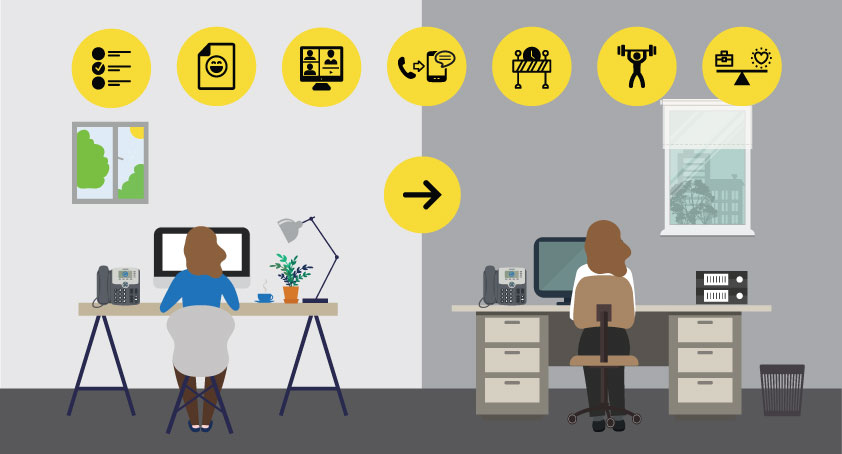Working from Home Lessons to Take Back to the Office

Across the country, stay-at-home guidelines are being lifted and slowly, one by one, companies are starting to invite employees back to work. Things may not be back to normal, whatever that word even means anymore, but they’ll certainly be closer to the work environment we’re used to.
Working from home posed numerous new challenges for businesses, but it also provided an opportunity to try out new ways of “working."
Some of these, like taking a work call without wearing pants, are better left for when you are working from home. But there’s no need to throw the baby out with the bathwater. There are plenty of productivity ideas that you’ve been experimenting while at home that can enhance your ability to work when you are back in your office.

1. Write Yourself Daily and Weekly Task Lists
In our 10 Trusty Tips for Working from Home, we discussed how setting agendas ahead of time leads to higher productivity. While your office has probably fewer distractions than your home, writing manageable task lists at the start of every week and every day is a great way to stay focused no matter what curveballs come your way.
It’s called hyperbolic discounting, and it works the same way that making a shopping list beforehand helps keep you from buying unhealthy or unnecessary food. Especially during the excitement of returning to the office, it’s equally important to stay on-task and not over-commit. Having concrete, achievable goals laid out for both your day and week is an easy way to accomplish both.

2. End Your Day by Starting a Fun Project
Whether you’re working from home or back at your desk, starting a new project can be daunting (especially first thing in the morning). If you’re like me, you tend to procrastinate by getting a cup of coffee, chatting with the receptionist, getting a second cup of coffee, checking ESPN, getting a third cup of… you get the idea.
Instead, try to plan out and even start new projects at the end of your day so you can dive right in the next morning. The fewer mental hurdles there are between you and productive work, the less likely you are to stumble over some distraction or another.
Plus, this strategy allows you to look at your projects with a fresh set of eyes before you get too far to change course if needed. Especially when it comes to editing or long-term planning, I find that looking over my afternoon ideas with a morning mindset saves me from a lot of headaches.

3. Schedule Shorter Meetings More Often
As everyone adapted to the disjointed pace of working from home, it became much more difficult to schedule meetings with multiple people.
Kids needed to be attended to. Lunch wasn’t going to make itself and. And naps, well, naps needed to be taken.
By necessity, team or department powwows were boiled down to the truly essential topics and questions.
Instead of going back to the way things used to be – with meetings so long you had to order food in the middle of them just to keep employees invested – continue keeping things short and to the point. If a question doesn’t involve everyone present, save it for a direct message. If you haven’t yet made progress on a project, don’t bother bringing it up. Questions like “How was everyone’s weekend?” may break the ice, but if your team is anything like ours, they always lead to lengthy tangents.
Much like we suggest setting task lists for yourself every day, always set agendas with your meeting invites and then stick to them.

4. Keep Forwarding Your Calls When You’re at the Office
While working remotely, making sure that your calls were being forwarded to your cell phone was a necessity. Now that you’re back in the office with your beloved desk phone, is it still?
Yes!
No matter how much of the day you spend at your desk, there are still opportunities for you to miss important calls. Maybe you got bamboozled into a string of meetings. Maybe you went out for lunch with a few coworkers you haven’t seen for a while. Maybe you just decided to stretch your legs and take a lap around the office. Whatever the case, having your extension forwarded to your cell phone makes sure you never miss a thing – just like it did at home.

5. Don’t be Afraid to Set Work Time Boundaries
At home, surrounded by partners, kids, and pets all clamoring for our attention, many of us were forced to set “Do Not Disturb” hours. These peaceful, critical time blocks allowed us to buckle down and focus on projects without fear of interruption.
Don’t be afraid to do the same at your office. Coworkers constantly stopping by your desk to chat or ask questions can derail your train of thought just as quickly as a hungry toddler.
For example, I block off the start and end of every week for the administrative tasks I tend to forget. On Monday morning, it helps me set priorities for the week. On Friday afternoons, it’s the time I take to send follow up/reminder emails and be sure we’re making good progress on long-term projects.

6. Work Out Before Work
Stuck at home for months, morning workouts became mandatory if you wanted to combat the lethargy and snack intake of quarantine. They also helped wake up your brain and start every day with a win.
Waking up early to work out before your morning commute may not sound like the most enjoyable thing in the world, but it will allow you to carry the benefits back into your normal work life. I can tell you from personal experience that I’ve only been drinking about half as much coffee since I started doing yoga instead of hitting snooze until right before my morning meeting.

7. Maintain Your New and Improved Work-Life Balance
I just have a grumpy cat to take care of during these uncertain times, so I turned to our very own Marketing Director Eli Gurock to explain how the extended period of working from home has affected his scheduling.
“My wife and I plan meals and child care responsibilities for the week on Sunday evenings. When we were both working from home, we talked about who had early morning or late afternoon meetings and calls so the other knew when they’d need to put their Primary Parent hat on.
Now that we’re back in the office, those Sunday planning sessions are just as helpful to talk about daycare pick up duties and deadlines for when we each need to be home.”
One of the most important lessons to take from this pandemic is that sometimes it’s okay to plan more around your family and less around your office. Keep doing what’s best for you and you’ll notice how much more productive you are at work without the added stresses you left behind.
Across the country, stay-at-home guidelines are being lifted and slowly, one by one, companies are starting to invite employees back to work. Things may not be back to normal, whatever that word even means anymore, but they’ll certainly be closer to the work environment we’re used to.
Working from home posed numerous new challenges for businesses, but it also provided an opportunity to try out new ways of “working."
Some of these, like taking a work call without wearing pants, are better left for when you are working from home. But there’s no need to throw the baby out with the bathwater. There are plenty of productivity ideas that you’ve been experimenting while at home that can enhance your ability to work when you are back in your office.

1. Write Yourself Daily and Weekly Task Lists
In our 10 Trusty Tips for Working from Home, we discussed how setting agendas ahead of time leads to higher productivity. While your office has probably fewer distractions than your home, writing manageable task lists at the start of every week and every day is a great way to stay focused no matter what curveballs come your way.
It’s called hyperbolic discounting, and it works the same way that making a shopping list beforehand helps keep you from buying unhealthy or unnecessary food. Especially during the excitement of returning to the office, it’s equally important to stay on-task and not over-commit. Having concrete, achievable goals laid out for both your day and week is an easy way to accomplish both.

2. End Your Day by Starting a Fun Project
Whether you’re working from home or back at your desk, starting a new project can be daunting (especially first thing in the morning). If you’re like me, you tend to procrastinate by getting a cup of coffee, chatting with the receptionist, getting a second cup of coffee, checking ESPN, getting a third cup of… you get the idea.
Instead, try to plan out and even start new projects at the end of your day so you can dive right in the next morning. The fewer mental hurdles there are between you and productive work, the less likely you are to stumble over some distraction or another.
Plus, this strategy allows you to look at your projects with a fresh set of eyes before you get too far to change course if needed. Especially when it comes to editing or long-term planning, I find that looking over my afternoon ideas with a morning mindset saves me from a lot of headaches.

3. Schedule Shorter Meetings More Often
As everyone adapted to the disjointed pace of working from home, it became much more difficult to schedule meetings with multiple people.
Kids needed to be attended to. Lunch wasn’t going to make itself and. And naps, well, naps needed to be taken.
By necessity, team or department powwows were boiled down to the truly essential topics and questions.
Instead of going back to the way things used to be – with meetings so long you had to order food in the middle of them just to keep employees invested – continue keeping things short and to the point. If a question doesn’t involve everyone present, save it for a direct message. If you haven’t yet made progress on a project, don’t bother bringing it up. Questions like “How was everyone’s weekend?” may break the ice, but if your team is anything like ours, they always lead to lengthy tangents.
Much like we suggest setting task lists for yourself every day, always set agendas with your meeting invites and then stick to them.

4. Keep Forwarding Your Calls When You’re at the Office
While working remotely, making sure that your calls were being forwarded to your cell phone was a necessity. Now that you’re back in the office with your beloved desk phone, is it still?
Yes!
No matter how much of the day you spend at your desk, there are still opportunities for you to miss important calls. Maybe you got bamboozled into a string of meetings. Maybe you went out for lunch with a few coworkers you haven’t seen for a while. Maybe you just decided to stretch your legs and take a lap around the office. Whatever the case, having your extension forwarded to your cell phone makes sure you never miss a thing – just like it did at home.

5. Don’t be Afraid to Set Work Time Boundaries
At home, surrounded by partners, kids, and pets all clamoring for our attention, many of us were forced to set “Do Not Disturb” hours. These peaceful, critical time blocks allowed us to buckle down and focus on projects without fear of interruption.
Don’t be afraid to do the same at your office. Coworkers constantly stopping by your desk to chat or ask questions can derail your train of thought just as quickly as a hungry toddler.
For example, I block off the start and end of every week for the administrative tasks I tend to forget. On Monday morning, it helps me set priorities for the week. On Friday afternoons, it’s the time I take to send follow up/reminder emails and be sure we’re making good progress on long-term projects.

6. Work Out Before Work
Stuck at home for months, morning workouts became mandatory if you wanted to combat the lethargy and snack intake of quarantine. They also helped wake up your brain and start every day with a win.
Waking up early to work out before your morning commute may not sound like the most enjoyable thing in the world, but it will allow you to carry the benefits back into your normal work life. I can tell you from personal experience that I’ve only been drinking about half as much coffee since I started doing yoga instead of hitting snooze until right before my morning meeting.

7. Maintain Your New and Improved Work-Life Balance
I just have a grumpy cat to take care of during these uncertain times, so I turned to our very own Marketing Director Eli Gurock to explain how the extended period of working from home has affected his scheduling.
“My wife and I plan meals and child care responsibilities for the week on Sunday evenings. When we were both working from home, we talked about who had early morning or late afternoon meetings and calls so the other knew when they’d need to put their Primary Parent hat on.
Now that we’re back in the office, those Sunday planning sessions are just as helpful to talk about daycare pick up duties and deadlines for when we each need to be home.”
One of the most important lessons to take from this pandemic is that sometimes it’s okay to plan more around your family and less around your office. Keep doing what’s best for you and you’ll notice how much more productive you are at work without the added stresses you left behind.
Visited 386 Times, 2 Visits today


